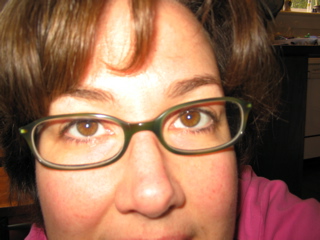Religion
She: I'm a spiritual person, but I don't consider myself religious.
Me: Really? I'm Unitarian and I consider myself religious.
She: (laughing) But Unitarians don't believe anything!
Me: That's not true! We believe in the inherent worth and dignity of all people.
She: How is that religious?
Me: How is that not religious?
I went on to explain that if religion's purpose is to answer the big questions in life, then a belief in the inherent worth and dignity of all people is a pretty distinct religious belief. This belief leads me to abhor violence (I have never understood why Christians are so eager to go to war, or so adament about their right to shoot each other in their own homes). This belief is the structure by which I interact with others, the way I expect to be treated, and the way I expect society to treat its members. And regarding a more "traditional" religious issue, it leads me to the Universalist belief that all people are of equal worth in life, in death, and in whatever may come afterwards.
For clarity, UU's covenent to affirm and promote seven principles:
- The inherent worth and dignity of every person;
- Justice, equity and compassion in human relations;
- Acceptance of one another and encouragement to spiritual growth in our congregations;
- A free and responsible search for truth and meaning;
- The right of conscience and the use of the democratic process within our congregations and in society at large;
- The goal of world community with peace, liberty, and justice for all;
- Respect for the interdependent web of all existence of which we are a part.
- Direct experience of that transcending mystery and wonder, affirmed in all cultures, which moves us to a renewal of the spirit and an openness to the forces which create and uphold life;
- Words and deeds of prophetic women and men which challenge us to confront powers and structures of evil with justice, compassion, and the transforming power of love;
- Wisdom from the world's religions which inspires us in our ethical and spiritual life;
- Jewish and Christian teachings which call us to respond to God's love by loving our neighbors as ourselves;
- Humanist teachings which counsel us to heed the guidance of reason and the results of science, and warn us against idolatries of the mind and spirit;
- Spiritual teachings of earth-centered traditions which celebrate the sacred circle of life and instruct us to live in harmony with the rhythms of nature.
I haven't always considered myself a religious person. I used to make the same claim to "spirituality without religion" that my friend made. But that is no longer true for me. I speak freely about going to church, about what I learn there, and how I feel about it. Sometimes people ask me, "What church do you go to?" I tell them, and sometimes I get a variation on my friend's response above. But I challenge you, dear reader, to draw a distinction between someone who is truly living their Christian or Jewish faith (or any other faith you might be familiar with) and someone who is truly living their UU faith. I think you will find it just as easy to see who is religious and who is not. Being religious is not a bad thing; it is nothing to be ashamed of. Our high school aged youth group is called YRUU -- Young Religious Unitarian Universalists. They rock! They came to a youth services meeting that I coordinate, and when asked what support queer and questioning youth would receive in their congregation they were emphatic that they would not be UU's if they were not welcoming to youth of any sexual orientation. They affirm and promote the inherent worth and dignity of all people. They are religious. So am I.


0 Comments:
Post a Comment
<< Home